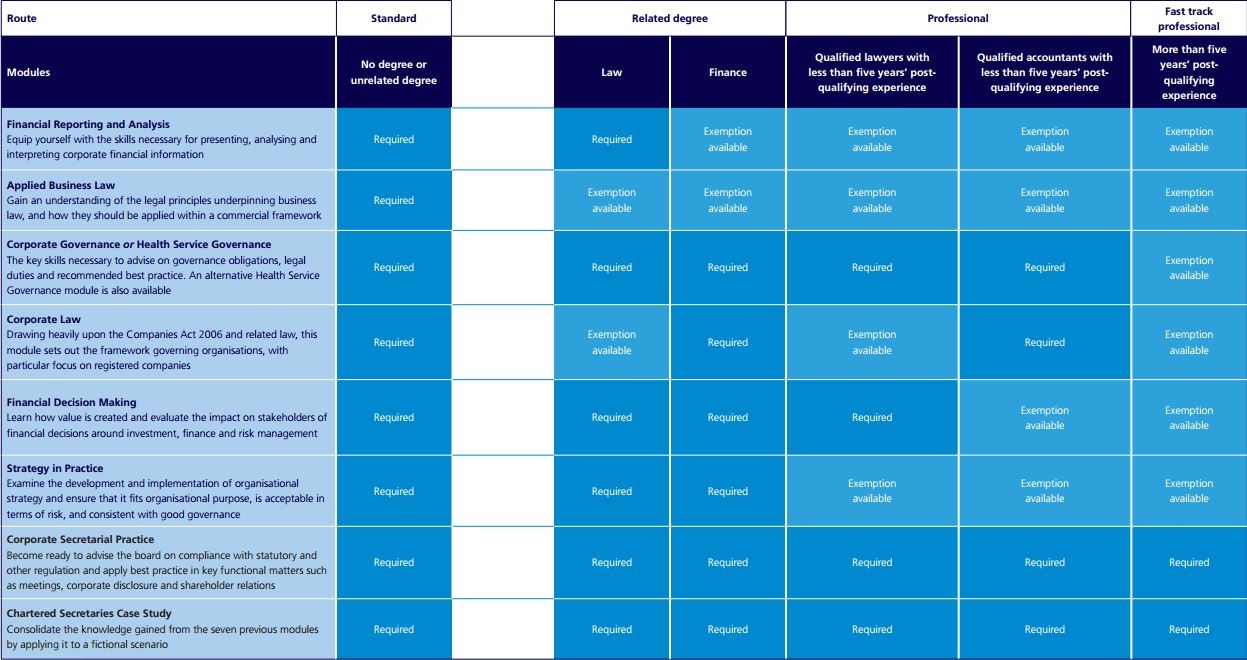
What if you could put your legal knowledge to good use in a job which boasts variety, responsibility and a competitive salary to boot? The Lex 100 editor Hawys Boobier finds out more about the unique and exciting role of a company secretary and why there aren’t many jobs like it.
If somebody asked you what a company secretary does, would your mind automatically jump to managing diaries and booking meeting rooms? If so, you would be entirely misled. The role of a company secretary is completely different to that of a traditional secretary. But what exactly is it?
To use the official language, company secretaries are governance professionals. They are valued strategic advisers with in-depth knowledge of law, taxation, finance and management who give independent, impartial advice and support to directors, trustees and other key decision makers across the private, public and not-for-profit sectors. They support and advise the boards of organisations and ensure that the organisation they work for is complying with regulatory standards. In an increasingly regulated world, it goes without saying that this is no mean feat.
To say that the role of a company secretary is broad would be an understatement. Typical responsibilities can range from managing the shareholder register to drafting parts of a company’s annual report. “In the morning I could be liaising with our print manager about the printing of our Annual Report and Accounts and later that afternoon I could be researching and drafting a paper for submission to the Board of Directors for review/approval”, says Jillian Elliot, assistant company secretary at Centrica plc’s Secretariat. Company secretaries ensure that crucial information flows securely to the correct people, that board meetings are effective and that proper records are kept. In short, they help companies avoid risk.
The conscience of an organisation
Working in such close proximity to the board of directors inevitably means being privy to some of the most important decisions made within a company. “It’s very rare to be in a profession where your work is directly exposed to the board”, says Adaeze Okike, senior chartered secretary at Aviva plc. Far from being confined to one department, company secretaries gain an insight into the many different areas within a business, making them all-seeing, all-knowing and consequently extremely valued. They become an integral cog, to such an extent that company secretaries are often referred to as ‘the conscience of an organisation’.
The breadth of the role means that knowledge is acquired quickly. It follows that rising up the ranks can happen more swiftly than you might think. “You get very high exposure to the management of the company, but with that comes added responsibility”, says Adaeze. As the responsibility grows, so too can the salary, meaning that the move up the remuneration ladder can also be a rapid one.
The career progression path is clear, although it is by no means narrow or rigid. The skills acquired by a company secretary are transferrable, so you can apply them to a field which interests you – be that charity, sport, finance or fashion.
Since the financial crisis and more recently Brexit, the spotlight on regulation has brought governance to the top of the corporate agenda. Recent news stories to make the headlines, such as the pension deficit at former national retailer BHS and the controversial employment conditions at sports retailer Sports Direct, are emblematic of the potential consequences of inadequate governance. With governance currently such a hot topic, it comes as no surprise that there is a pressing need for high-quality company secretaries.
Case Study
Ceri James
What is your role?
I am a company secretarial assistant at National Grid plc. I support the company’s Audit Committee, Nominations Committee and Remuneration Committee. I undertake a wide range of governance activities related to compliance and risk. I manage the company insider list and ensure that the company is in line with legislation and with Financial Conduct Authority (FCA) requirements. I also look after a range of operational subsidiary companies. This involves attending and producing minutes of board meetings, dealing with appointments/resignations, filing with Companies House and advising the board on any governance issues. As a team we co-ordinate the Annual General Meeting of shareholders and draft the corporate governance section of the annual report and accounts.
What is your background?
I graduated from Reading University in 2011 with a LLB in law. I worked at Mills & Reeve in Birmingham for a year and then I moved to National Grid to work in the insurance team where I met someone who was a company secretary. I had no idea what this was but it sounded interesting and relevant to my experience so I made contact with the team. I was lucky enough that a position opened within the Company Secretarial team a short while later, which I applied for and was offered the job.
What are your qualifications?
Upon starting in the company secretariat team at National Grid, I began studying for the Chartered Secretary Qualifying Scheme (CSQS). I qualified in January 2017 and achieved Associate Chartered status in April after meeting the appropriate work experience criteria.
Tell us about an interesting case or matter you’ve worked on
With the enforcement of the EU Market Abuse Regulations legislation in July 2016, I was part of the project group responsible for ensuring that National Grid’s processes were updated in order to comply with the new requirements. This meant that a thorough review was undertaken of the previous share dealing rules, disclosure rules and insider list management. With another member of my team, I carried out training across key teams in the company to ensure that the new regulations were understood by those who might be affected, such as our investor relations team. This was an interesting area as it is a huge piece of legislation which affects every listed company and providing training throughout the company provided insight into how far-reaching this was. The implications of non-compliance are also very significant and so it was a lot of responsibility.
What are the biggest challenges in your job?
Competing priorities, managing very senior stakeholders and keeping abreast of changes in the governance landscape, this is especially relevant with the current Corporate Governance review being undertaken by the Government which is proposing some potentially huge changes in corporate governance.
What is the best thing about your job?
It is so varied and provides an amazing view of a company from the very top level. Working as a company secretary also gives you the chance to work in any FTSE company or any unlisted company which requires a company secretary.
What advice would you give to somebody who is interested in your career?
Write to some FTSE companies, big and small, and ask to do some work experience because it really is invaluable. The role of the company secretary varies so much that the best way to get a real feel for it is to see it in action. If you are interested in a career which is related to law but perhaps aren’t sure if being a lawyer is for you then it is a perfect alternative – it has so many elements of law but provides the opportunity to apply them in a different, more commercial way. Having an overview of the business from the top level is also such a privileged position to be in, which you wouldn’t get to see unless you’re on the board. There aren’t many jobs like it!
How do I get in?
Because of the nature of the role, a degree or background in law or finance is highly advantageous. If you’re studying law, the chances are that you’re on your way to being partially qualified.
“I thought I wanted to be a solicitor and after completing my A-Levels I accepted a place at Durham University to study law. Although I thoroughly enjoyed my degree, I realised that I did not want to specialise in one area of law only. Having reviewed ICSA’s website, I quickly realised that being a chartered secretary would make use of my degree, enable me to be involved in a number of legal practice areas and utilise my skill set” says Jillian.
A legal background could mean that you are exempt from taking the total number of required exams and the best news is that many companies will often pay for your training, so you can ‘earn while you learn’.
See the grid below for the required academic and professional qualifications for the Chartered Secretaries Qualifying Scheme (CSQS).
Visit the ICSA website for more details.
How do I know if it’s for me?
As with any role, the best way to find out if a company secretarial position is for you is to see it in action. Work experience is an invaluable way to get a real feel for the role and to meet people who can give you advice gained from first-hand experience.
“If you’re interested in a career as a chartered secretary, go for it. Look for work experience at public limited companies, housing associations, charities, the NHS and universities, as all of these institutions have secretariats. Another great way to get experience is to volunteer for a committee, for example a sports association or a university committee” says Jillian.
But don’t worry if you don’t have a couple of weeks to spare. Every year, ICSA/DMJ Legal hosts a series of Insight Days, which are held in conjunction with companies such as Aviva, Sky plc and Rolls Royce. Insight Days allow you to go into a company for the day and take a look behind the scenes at the various responsibilities of a company secretary. Insight Days are open to students, post graduates, or anyone considering an entry to company secretarial practice. ICSA also offer one day shadowing opportunities. For details of 2017 Insight Days, one day shadowing, work experience & trainee roles – click here.
Case Study
What is your role?
I am assistant company secretary at PA Consulting Group, which is a global consultancy firm.
What is your background?
I studied Law at Kings College London and then went on to study the Accelerated LPC at BPP University. I then joined the Ingenious Group, which is a group of FCA regulated businesses/investment services including asset management, corporate finance and individual investments. From there I moved to PA Consulting Group.
Tell us about an interesting case or matter you’ve worked on
When I was at Ingenious working in their clean energy function, we founded and developed a joint venture between the Ingenious Group and another company which became the largest privately owned energy asset in the UK. My role involved transactional due diligence, setting up the company, setting up articles and setting up the governance structure. The joy of working as a company secretary is that you get given work from the directors, shareholders and everyone involved.
What skills do you need to succeed in your job?
You need a broad legal understanding – you can be asked anything legal from day one and so I do fall back on what I learnt on the LPC.
You also need to be able to retain your objectivity. You have to be ready to challenge senior people within a company and you need to do this in the appropriate way and have the legal and financial knowledge to back it up.
What are the biggest challenges in your job?
Having to adapt to changing business needs whilst ensuring proper continuity of service. Also, the constantly evolving legislative landscape.
What is the best thing about your job?
The variety is definitely my favourite part – being involved in a completely unexpected subject and diving into a topic you’ve never encountered before. I also enjoy working alongside absolute experts and senior members of an organisation. You get unprecedented access to senior people and to why they make certain decisions. This is such a privilege and helps you develop a certain level of understanding.
What advice would you give to somebody who is interested in your career?
Write to the companies you are interested in – the worst thing they can do is say no. I mentored a girl outside of work who loved fashion so I encouraged her to write to relevant companies to get work experience. She wrote to Aspinal (a luxury leather goods manufacturer and retailer) and ended up working for them for a couple of months. Listen and watch those with whom you work and immerse yourself in the company’s culture and learn from that. Enjoy – you are constantly learning and developing.





